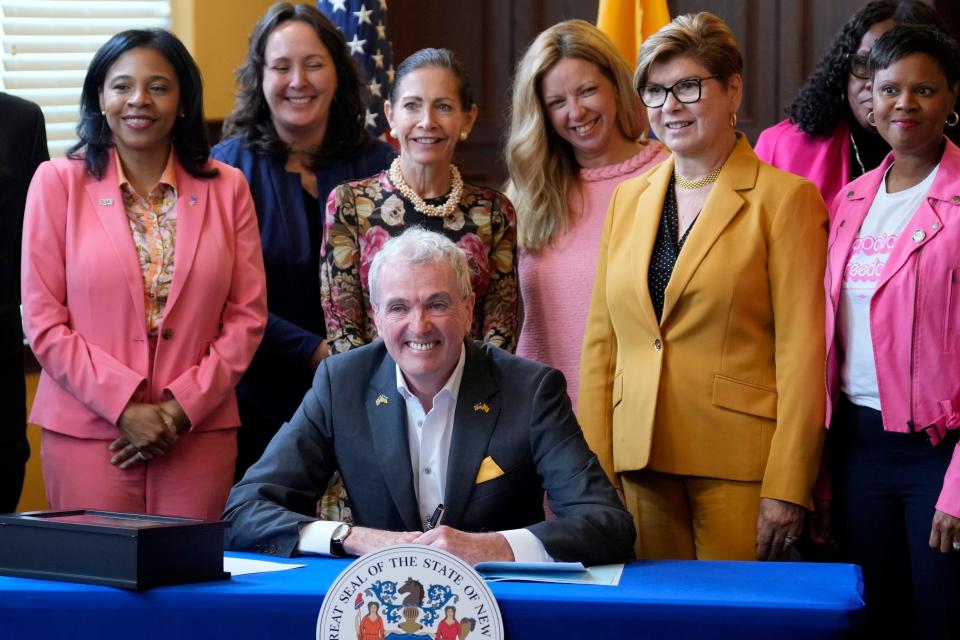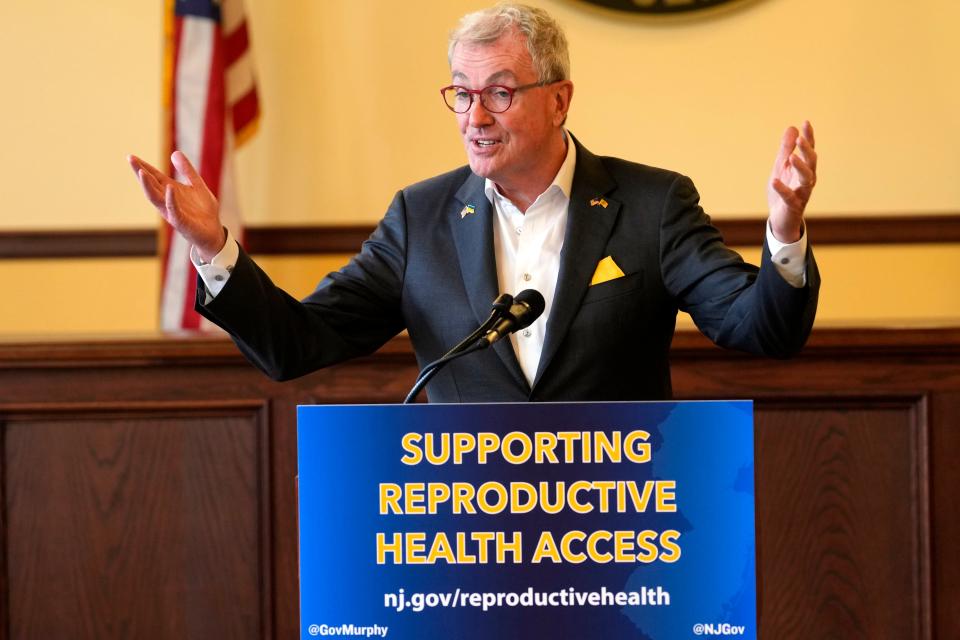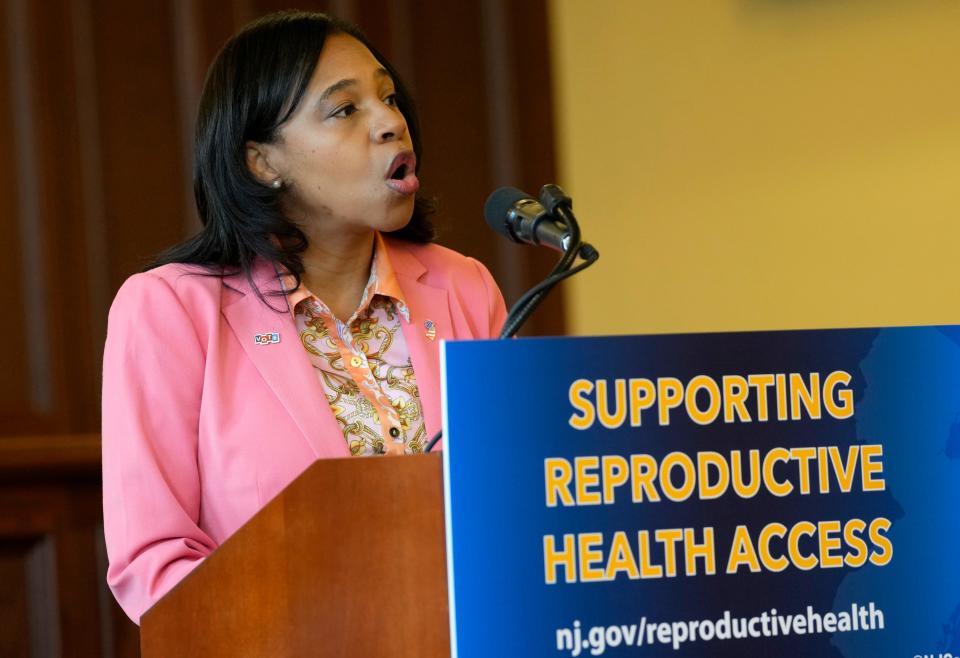Phil Murphy signs new NJ law that expands access to reproductive rights resources
- Oops!Something went wrong.Please try again later.
With the swipe of a pen, New Jersey now has a one-stop shop for reproductive health care information. At the Glen Rock Municipal Building on Tuesday morning, Gov. Phil Murphy signed into law a bill to create a website full of information about access to and availability of health care resources.
The governor called Glen Rock, the only municipality in New Jersey with a governing body of all women, a “living testament to the power of female leadership” and said the “world would be in a lot better shape if we could say the same about the United States Supreme Court.”
“New Jersey is and always will be a safe haven for reproductive health care, period,” Murphy said. “At a moment when far-right extremists are waging war on reproductive health care freedoms, it has never been more important for our citizens to be armed with the facts they need to make informed decisions about their health and their future.”

The fact that Election Day is just two weeks away was not forgotten, either. State Sen. Joseph Lagana and Assemblywoman Lisa Swain, both of the battleground District 38, were on hand to talk about the importance of protecting reproductive health care access.
Lagana noted that the site will be “pivotal to helping our residents weed out misleading and sometimes dangerous information,” and Swain said she is “incredibly thankful to live in a state that not only values women’s privacy but takes critical steps like we are taking today to ensure full access to accurate health care information.”

Murphy also criticized a plan to cut spending that was released by state Senate Minority Leader Anthony Bucco this week. The plan, which Bucco said was a road map to what a Republican-led chamber would prioritize, included cuts to funding for reproductive health care.
Sarah Fajardo, the policy director for ACLU-NJ, thanked the governor and legislative sponsors for making this possible.
“As these devastating attacks on our rights continue to unfold, ensuring all New Jerseyans have access to accurate information and resources related to reproductive rights and health is paramount,” she said.
Previous: This is why reproductive rights are an issue in NJ's legislative election
What will the new website do?

The site includes information on what reproductive rights are legally protected and about health benefits coverage for reproductive health care services. That includes medical, surgical, counseling or referral services relating to pregnancy, contraception or termination of a pregnancy.
The site provides information about rights afforded under state law, including:
to access and receive emergency reproductive health care services.
to access and use contraception, including, but not limited to, condoms, diaphragms, spermicides, contraceptive vaginal rings, transdermal contraceptive patches, contraceptive hormonal injections, hormonal contraceptive pills, uterine implants, intrauterine devices and surgical and non-surgical sterilization.
to self-determination concerning the use of contraception, and the right under state law to refuse sterilization.
to access and use prescription and non-prescription medications for reproductive health care.
to carry a pregnancy to term and the right to terminate a pregnancy, as well as to access services related to childbirth and abortion care.
to access preventive reproductive health care services.
to receive reproductive health care services regardless of insurance status, along with links to appropriate internet websites and other resources that can provide assistance in enrolling individuals without insurance or who are underinsured in a health benefits plan or to apply for medical assistance under the Medicaid or NJ FamilyCare programs.
a resource page, or a link to a resource website, where patients can find current, verified reproductive health care providers, including abortion care providers.
information on where and how to file a complaint in the event that an individual’s reproductive rights are violated.

Murphy also noted that there was a Medicaid rate increase as of Oct. 1 that will reimburse reproductive health care providers for their services, as well as a $5 million state-funded training program for abortion providers and to integrate abortion care into training curricula for health professionals at Rutgers.
He also pointed out that there is $5 million in grants for security upgrades for reproductive health care facilities in New Jersey. The application deadline for that program is Oct. 31.
The Murphy administration has taken several preemptive steps to ensure reproductive care access in the wake of the federal Supreme Court decision in Dobbs v. Jackson Women's Health Organization, which overturned Roe v. Wade and removed federal reproductive health protections that had been in place for generations.
Measures have been taken throughout the country to codify protections, but New Jersey legislators have taken it even further by prohibiting people who receive or perform an abortion in New Jersey from being extradited to a state that restricts or criminalizes the procedure and even barring public agencies in New Jersey from providing information to help in investigations by states that criminalize abortion.
The state has also expanded access by requiring companies regulated by the state’s Department of Banking and Insurance to provide comprehensive abortion coverage as a part of all health benefit plans and making birth control available over the counter.
Katie Sobko covers the New Jersey Statehouse. Email: sobko@northjersey.com
This article originally appeared on NorthJersey.com: NJ reproductive rights laws: Murphy bill creates resource portal

